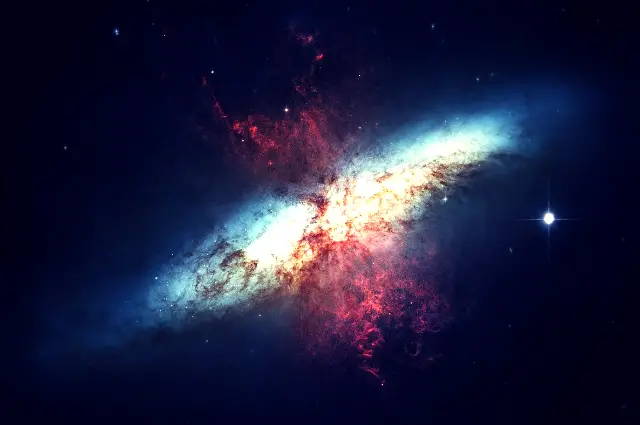Unraveling the Cosmos: Exploring the Mysteries of the Universe
Unlocking the Wonders of the Cosmos: 10 Cosmic Revelations

Cosmos: The cosmos, a term that has captured the imagination of humanity for millennia, encompasses the vast expanse of our universe. In this article, we delve into the cosmos, exploring its infinite wonders, from celestial bodies and cosmic phenomena to the profound questions that have fueled our curiosity for centuries.

Cosmos – A Definition
Before we embark on our cosmic journey, let’s define the term “cosmos.” The cosmos refers to the entirety of space, time, and all matter and energy within the universe. It’s a term that encapsulates everything that exists, from the smallest subatomic particles to the grandest galaxies.
The Cosmic Timeline
The cosmos has a rich history, dating back approximately 13.8 billion years to the Big Bang. We’ll take a chronological look at the major milestones in the universe’s evolution, from the formation of stars to the emergence of life on Earth.
Cosmic Wonders
Stellar Nurseries and Nebulae: Nebulae, often referred to as “cosmic nurseries,” are vast clouds of gas and dust where stars are born. These captivating regions give birth to the celestial objects that light up our night sky.
Black Holes – Cosmic Enigmas:
Black holes, with their powerful gravitational pull, are some of the most mysterious and intriguing objects in the cosmos. We’ll explore their properties and their role in the universe.
Galaxies and Their Diversity:
The cosmos is home to countless galaxies, each with its unique characteristics. We’ll uncover the different types of galaxies and their significance in the grand cosmic tapestry.
Exoplanets – The Search for Habitable Worlds:
The quest to find planets beyond our solar system, known as exoplanets, has expanded our understanding of the cosmos and the potential for life elsewhere in the universe.
Cosmic Questions
Throughout history, humans have asked profound questions about the cosmos. Here are some of the most enduring queries:
Are We Alone in the Universe?
The search for extraterrestrial life continues, with ongoing missions and the study of extremophiles on Earth providing tantalizing clues.
What Is Dark Matter?
Dark matter is an invisible substance that makes up a significant portion of the universe’s mass. While its existence is confirmed, its nature remains a mystery.
The Fate of the Universe – Expansion or Contraction?
Answer: The fate of the cosmos hinges on the balance between dark energy and gravity. Current evidence suggests the universe is expanding, but the ultimate outcome is uncertain.
Cosmic Microwave Background – Echoes of the Big Bang
Answer: The cosmic microwave background radiation is a relic of the Big Bang, providing valuable insights into the early universe’s conditions.
Is Time Travel Possible?
Answer: The concept of time travel remains a subject of scientific exploration and theoretical physics, with no definitive answers yet.
The Multiverse – Are There Parallel Universes?
Answer: The multiverse hypothesis proposes the existence of multiple universes, each with its own set of physical laws. While speculative, it’s a topic of significant interest.
The Origin of Life – A Cosmic Puzzle
Answer: The origin of life on Earth is still a topic of debate, with various theories exploring the possibility of extraterrestrial influence.
The Great Filter – Explaining the Fermi Paradox
Answer: The Fermi Paradox suggests that, given the vast number of potentially habitable planets, we should have encountered extraterrestrial civilizations by now. The Great Filter theory offers possible explanations for our lack of contact.
The Nature of Dark Energy
Answer: Dark energy is a mysterious force driving the universe’s accelerated expansion. Its true nature remains elusive, challenging our understanding of fundamental physics.
Cosmic Inflation – Rapid Expansion at the Dawn of Time
Answer: Cosmic inflation is a theory that explains the rapid expansion of the universe shortly after the Big Bang, providing an elegant solution to several cosmological puzzles.
Cosmic Exploration and Beyond
Humanity’s quest to explore the cosmos has led to remarkable achievements. From the Apollo moon missions to the Mars rovers and interstellar probes, we continue to push the boundaries of our understanding and capabilities.
Conclusion
As we conclude our cosmic journey, we reflect on the profound mysteries, wonders, and questions that the cosmos presents to us. It’s a testament to human curiosity and ingenuity that we continue to seek answers and explore the limitless expanse of the universe.
define our quest for knowledge. The universe is an ever-evolving tapestry, and as we gaze into the night sky, we’re reminded that our cosmic journey is far from over.
Now, it’s your turn to embark on your cosmic exploration, armed with a deeper understanding of the cosmos and its enigmatic allure. The universe beckons and there are countless cosmic revelations awaiting your discovery.
FAQs:
What is the cosmos?
The cosmos refers to the entirety of space, time, and all matter and energy within the universe.
How old is the cosmos?
The universe is approximately 13.8 billion years old, dating back to the Big Bang.
What are black holes?
Black holes are regions in space where the gravitational pull is so strong that nothing, not even light, can escape from them.
Are there other galaxies besides the Milky Way?
Yes, the cosmos is home to countless galaxies, each with its unique characteristics.
What are exoplanets?
Exoplanets are planets that orbit stars outside our solar system. They are a key focus in the search for habitable worlds.
Is there extraterrestrial life in the cosmos?
The search for extraterrestrial life continues, with ongoing missions and scientific research.
What is dark matter?
Dark matter is an invisible substance that makes up a significant portion of the universe’s mass, but its nature remains a mystery.
Is time travel possible in the cosmos?
Time travel remains a subject of scientific exploration and theoretical physics, with no definitive answers yet.
What is the multiverse theory?
The multiverse hypothesis proposes the existence of multiple universes, each with its own set of physical laws.
What is cosmic inflation?
Cosmic inflation is a theory that explains the rapid expansion of the universe shortly after the Big Bang, addressing several cosmological puzzles



